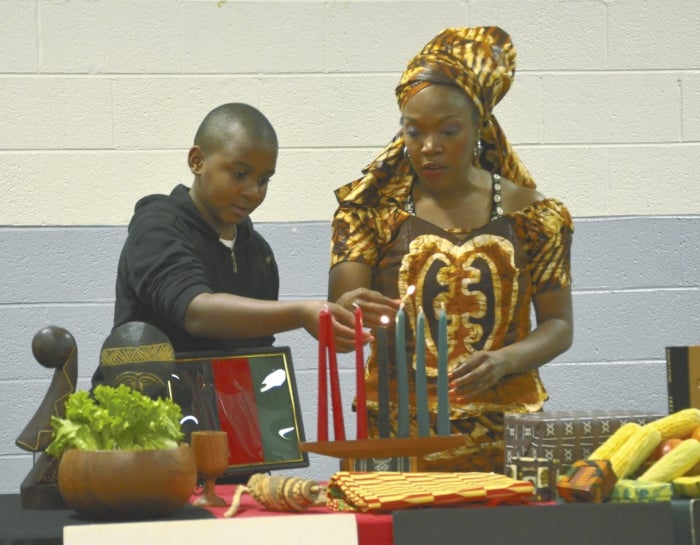The community gathers for annual Kwanzaa celebration
Published 12:00 am Monday, December 29, 2014

- Actress/writer April Turner helps Malakie Harris,9, light the kinara during the annual Kwanzaa celebration held Saturday at City Park Recreation Center. Turner mixed humor with folktales, drumming and gave a history of Kwanzaa traditions to everyone who gathered. Kwanzaa celebrations began Dec. 26 and will continue through Jan. 1. Shavonne Walker/Salisbury Post
Myriah Harris first learned about Kwanzaa during a Girl Scout program a few weeks ago. Her mother, Myra, thought it would be interesting to learn even more about the principles of this 48-year-old holiday.
Kwanzaa is a nonreligious holiday that begins Dec. 26 and is celebrated through Jan. 1. The holiday was created in 1966 by Dr. Maulana Karenga, an African studies professor at California State University. The holiday celebrates family, community and culture.
In the early years of the Kwanzaa celebration in Salisbury, the attendees went from house to house for activities and eventually it was held at the Miller Recreation Center. Organizer Eleanor Quadirah said the Kwanzaa celebration was even once held at Rowan Helping Ministries’ homeless shelter and the YMCA in Salisbury.
This year’s event, which is in its 20th year, was celebrated on Saturday at the City Park Recreation Center. Today is Ujamaa, the fourth day of Kwanzaa. In some Kwanzaa celebrations some families go to each other’s homes on a different day.
Quadirah said the event changes from year-to-year, but the event centers on the seven principles known in Swahili as Nguzo Saba.
The seven principles were created to introduce the seven basic values of African cultures, which are — Umoha (00-MOH-jah) or unity, Kujichaguila (koo-jee-cha-goo-LEE-ah) self-determination, Ujima (oo-JEE-mah) collective work and responsibility, Ujamaa (00-jah-MAH) collective economics, Nia (NEE-ah) purpose, Kummba (koo-OOM-bah) creativity and Imani (ee-MAH-nee) faith.
The greetings during Kwanzaa are in Swahili. Gifts are given mostly to children that include a kinara or candle holder, a book, African-based folktales, or something handmade.
Each day a candle is lit and the previous day’s candle is lit in conjunction with the new day. On day one a black candle is lit and on day two the black candle is lit along with a red one. As the week progresses a green candle is added to the kinara and the colors are repeated. Traditionally those gathered say how they are applying the seven principles in their lives.
The red symbolically represents the struggles of the African ancestors that included the blood that was shed, while black represents the African people and green symbolizes the fertile land of Africa and the hope that comes from their struggle.
“It’s important, especially for our young people, to know about their foundation,” McCullough said.
He said Kwanzaa is about self-esteem and you feel about yourself as a person.
“I want them to take responsibility for learning and be inspired to learn and do something,” said actress and writer April Turner.
Turner facilitated the event with explanations about the history of Kwanzaa and she also shared an African folktale and music with the audience. Nearly every audience member was given a musical instrument to play.
After the event organizers had a “feast” prepared by Chef Santos for those gathered. The feast is part of the celebration and can include southern soul food. The feast may take place on the first night, on New Year’s Eve or the last day of the celebration.
There were a few vendors and artisans at the event including the Spencer Doll and Toy Musem.
Retired educataor Sandra Smiling was one of those artisans. She’s originally from New York, but now lives in Cabarrus County. Since her retirement she’s been making and selling soaps at festivals and events. She attends six or seven shows a year. Smiling buys ingredients from Ghana and uses essential oils and other natural ingredients to make the soaps.
Contact reporter Shavonne Walker at 704-797-4253.




